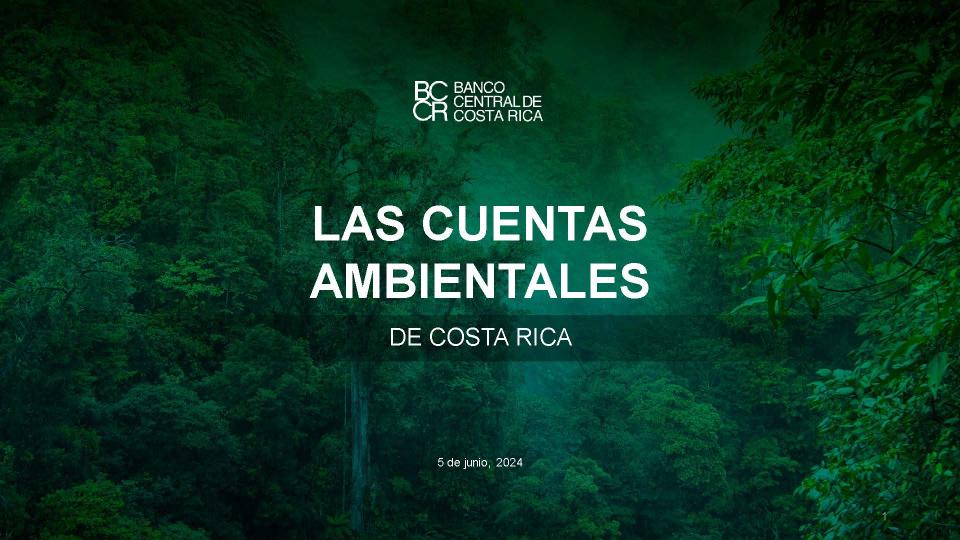Costa Rica updates Environmental Accounts and announces new applications and products

In the framework of World Environment Day, the last 5th June, the Central Bank of Costa Rica (BCCR) published new results for the Environmental Accounts. In this publication, the BCCR presented the update of the Water and Energy Accounts for the period 2018-2021 and the Material Flow Accounts for the years 2020-2023. In addition, two applications have been added to the Environmental Information Inventory to understand the contribution of biological resources to economic activities and tax revenues related to the environment.
Regarding water resources—the water account—agricultural activities use the largest volume of water (80% of the total use of this resource in 2021), despite these activities having decreased their share relative to the gross domestic product (GDP). In the same year, an average of 180 liters per day was supplied to each inhabitant, with an average price of $1.06 per cubic meter, which equates to an average daily expenditure of $0.2 per person.
During 2021, water distribution losses reached 67% of the extracted volume. In this regard, the 2023 Environmental Performance Review Report Economic Cooperation and Development (by the Organization for OECD) highlighted the need to accelerate and strengthen investment in water infrastructure to increase access to water and sanitation services, expand wastewater treatment, and reduce water losses.
In the energy account, over the 11 years of available data, the information shows that the country's energy intensity decreased by an average of 2.6% annually. This value indicates how many energy units (joules) are required to generate one million colones of added value ($1 610). The decrease in this indicator over time is a sign of greater energy efficiency at the national level.
Fossil fuel derivatives continue to be the primary source of carbon dioxide emissions from energy use. During 2021, the combustion of these products, mainly related to transportation, generated 80% of emissions of this gas. Of these emissions, households contributed an average of 35% of the total due to private transportation use.
Meanwhile, the Material Flow Account shows an increase in national material consumption, from 47 million tons in 2020 to 49 million tons in 2023, representing a per capita consumption of 9.2 tons for the last year. Costa Rica continues to heavily depend on the extraction of non-metallic minerals. Additionally, it maintains a pattern of importing fossil resources and exporting biomass, reflecting the complex interaction between our economy and the environment.
The characteristic activities of the bioeconomy—those that incorporate biological resources in their production and consumption processes—contributed 13% of the added value and generated 17% of employment in 2021. This category includes activities that make use of renewable biological resources for the sustainable production of food, materials, energy, and services. It is noteworthy that during the 2020-2021 period, the rate of change in added value in this group of activities was higher than the rest of the economy, demonstrating a remarkable post-pandemic recovery dynamic.
Finally, statistics on fiscal revenues related to the environment show the taxes collected on activities that have a proven negative impact on the environment. These taxes are classified into four categories: energy, transportation, natural resources, and pollution.
Costa Rica collects approximately 2.3% of GDP in environment-related taxes (2006-2023), higher than the OECD average of 1.6. The energy category contributes 66% of these revenues, followed by transportation (33%) and natural resources and pollution (1%). The most important specific taxes are the single fuel tax (66%), the vehicle property tax (19%), and the air exit fee from national territory (5%).
On this occasion, the complete information of the updated environmental accounts is presented in a data visualization tool, to make them more interactive and user-friendly. For more information, visit the following link: https://www.bccr.fi.cr/indicadores-economicos/cuentas-ambientales
Costa Rica
Multimedia resources:
Video on the results of the environmental accounts for 2024:
https://www.youtube.com/watch?v=OhGzmc2mE20
Presentation with main results:
Article shared by the Banco Central de Costa Rica (BCCR)
Related news: Ocean accounts
On 12 June 2024, the Government of Costa Rica announced the development of the first ocean account for the country. As a first step, Costa Rica has started with a project assessing the extent, condition and ecosystem services provided by mangroves.
Press release: https://www.presidencia.go.cr/noticias/costa-rica-contara-por-primera-vez-con-una-cuenta-ambiental-de-oceano
